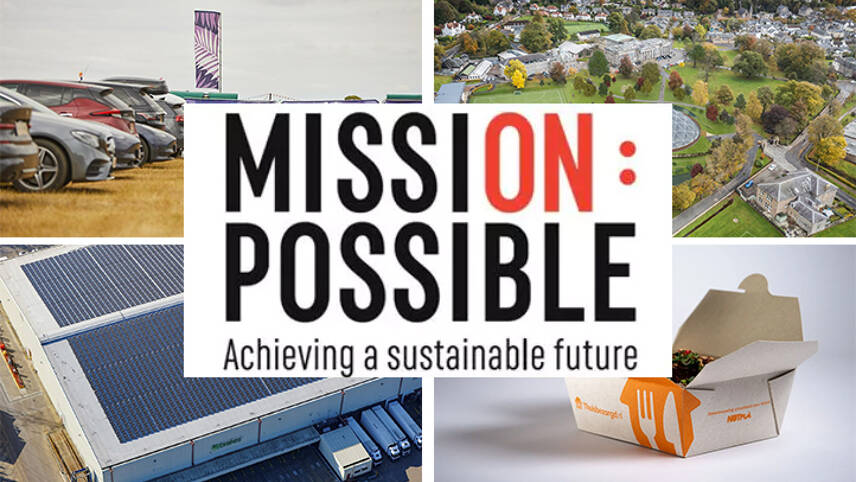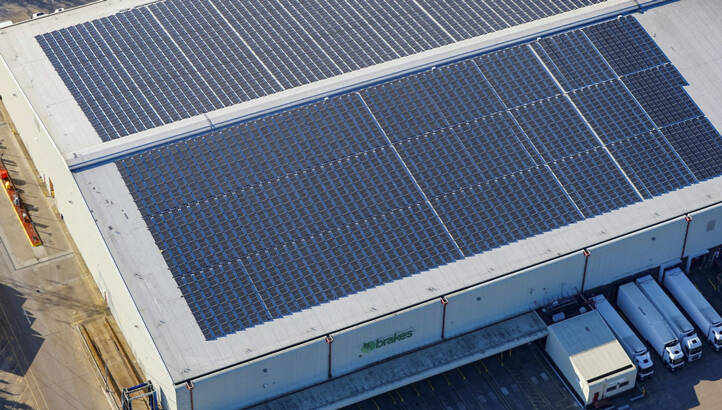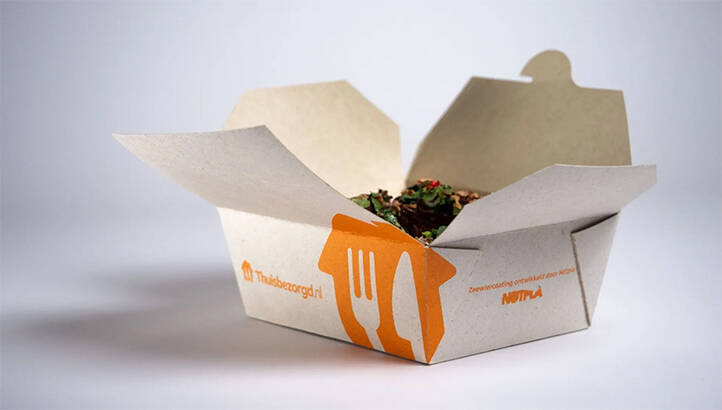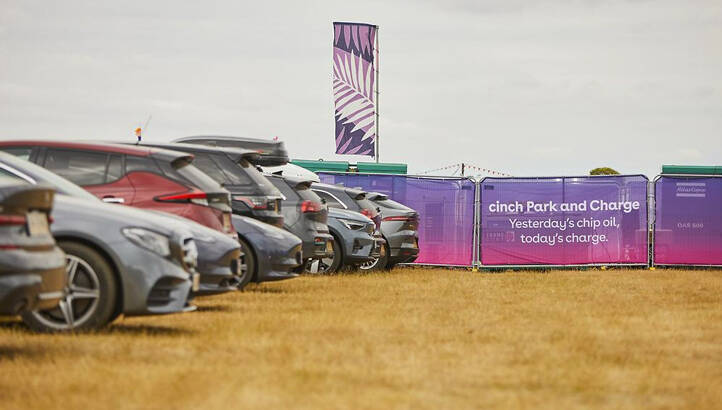Register for free and continue reading
Join our growing army of changemakers and get unlimited access to our premium content

Published every week, this series charts how businesses and sustainability professionals are working to achieve their ‘Mission Possible’ across the campaign’s five key pillars – energy, resources, infrastructure, mobility and business leadership.
Across the UK and the world, leading businesses, cities, states and regions are turning environmental ambitions into action. Here, we round up five positive sustainability stories from this week.
ENERGY: Brakes installs on-site solar at Harlow depot
Image: Fifth Dimension PR
A recent survey from manufacturing trade body Make UK found that four in ten firms in the sector see on-site renewable energy generation as a priority step to take to combat the price crisis and contribute to the low-carbon transition.
Then, this week, the edie team received news that wholesale foodservice supplier Brakes Group had completed the installation of a new rooftop solar array at its depot in Harlow, Essex. The array will generate electricity meeting 15% of the site’s annual requirements, with Brakes Group’s parent company Sysco confirming that it is the first major array to be installed in a phased programme across the UK. Tritax Big Box REIT Plc, the landlord for the Harlow site, collaborated with Brakes on this inaugural project.
“Since 2010, we’ve cut Scope 1 (direct) and 2 (power-related) emissions across Brakes by almost a third,” said Brakes’ environment director Peter Owen. “The Harlow installation, and those that follow, will help both us and our customers to cut our carbon footprint and contribute to tackling climate change.”
Brakes is aiming for a further 27.5% reduction in Scope 1 and 2 emissions by 2030 and is also engaging with suppliers to ensure that more than two-thirds of its Scope 3 (indirect) emissions are covered by approved science-based climate targets by 2026.
RESOURCES: Plastic-free, biodegradable food packaging rolled out for UEFA Women’s final
Outside of the sustainability sphere, one piece of good news millions of us have been discussing this week is that England’s Lionesses have made it to the final of the UEFA Women’s Euros for 2022. But, of course, all large-scale sporting events come with their own environmental footprint.
UEFA announced on Friday (29 July) that it has worked with Just Eat to add seaweed-coated, biodegradable food packaging to all outlets at Wembley Stadium for the event. Just Eat first unveiled the packaging format, produced in collaboration with packaging innovation brand Notpla, in 2020, and has been triallng it in the UK ever since.
Notpla boxes consist of a cardboard structure made using certified sustainable and recycled content. The structure is coated with a seaweed-based alternative which replaces synthetic additives traditionally used to make the packaging more waterproof. Notpla claims that the boxes biodegrade within weeks outside of industrial conditions. Veolia, which manages waste at Wembley, has been instructed to separate the boxes for anaerobic digestion.
“Using our global sponsorship partnership with UEFA is a perfect way to showcase this sustainable packaging initiative within the football industry, giving Just Eat the chance to drive and test new innovations with football fans,” said Just Eat Takeaway.com’s head of responsible business and sustainability Jaz Rabadia.
MOBILITY: UK’s biggest festival EV charging offer yet showcased at Latitude
We’re well and truly into the middle of festival season here in the UK. As we learned from researching our recent feature about Glastonbury, most festivals will see a majority of their emissions (up to 80%) coming from transporting fans, staff, acts and items to and from the site – meaning that organsiers need to find innovative and collaborative ways to encourage low-emission options.
One innovation in this space comes from car dealership platform cinch, which partnered with Latitude Festival organisers Festival Republic to showcase an off-grid electric vehicle (EV) charging station for 60 cars. It claims that the station, powered using hydrogenated vegetable oil (HVO), is the largest to have been installed at a British festival to date. Festival-goers were able to charge up for free so long as they pre-booked their space – and spaces sold out within an hour.
THE BUILT ENVIRONMENT: Plans unveiled for new energy self-sufficient academic hub in Scotland
In this section, we often spotlight a development built in line with established sustainability certifications such as BREEAM and LEED. This week, something perhaps more innovative was announced – plans for Scotland’s first development with ‘Living Building’ accreditation. The certification scheme asks designers and constructors to deliver only actions that have a net-positive impact on people and the planet.
The building in Clackmannanshire will play host to the Futures Institute at Dollar Academy (FIDA), acting as the education provider’s first physical hub. Designed by the architect behind Cornwall’s Eden Project, Andrew Whalley, the proposed structure would be energy self-sufficient and would use only the level of water within the planetary boundary limits of the site. It would be built using low-carbon materials and methods and the development would have a net benefit to local nature.
FIDA has not yet provided a likely timeline for the delivery of the new facility. The Institute itself was only launched last year, providing virtual learning equipping viewers with skills needed to deliver sustainable development initiatives.
Whalley said FIDA’s mission “requires an equally fresh approach to its future centre, with an architecture that will support team working, collaboration and exploring new creative sustainable solutions that will empower and inspire the next generation to tackle the planetary problems we now all face”.
BUSINESS LEADERSHIP: Childs Farm becomes first British B Corp in children’s personal care sector
In our last edition of sustainability success stories, we recapped on B Lab’s 022 ‘Best for the World’ list, recognizing the B Corps that are the top of their class in terms of either their impact with customers; impact on communities; impact on the environment; excellent governance or supporting workers. Click here for edie’s coverage of that story.
We also celebrated Simplyhealth’s certification as a B Corp, making it the world’s first health plan provider to certify.
This time around, we have good B Corp news to share from baby and child personal care brand Childs Farm. The Hampshire-based firm, which produces bath and skincare products for sensitive skin, scored almost 81 points on the B Impact assessment, which founder Joanna Jensen said is a great marker of the brand’s motto “kind to skin, kind to planet, kind to people”.
Jensen said: “we have a raft of plans to keep building on this success as we grow, minimising our impact on the environment. We’re extremely proud of our sustainability credentials and determined to continue to be best in class.”
Childs Farm is owned by PZ Cussons, which has stated that it is aiming to become a B Corp itself by the end of 2026. Debate has been lively recently about whether larger firms like PZ Cussons should be able to certify, after Nestle-owned Nespresso received its certification this spring.







Please login or Register to leave a comment.